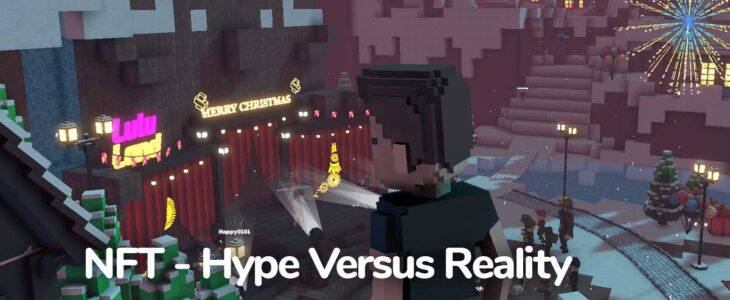
There is a maxim that I’ve learned over the years – Just because a technology could be used for something, doesn’t mean it should.
From SMS to WAP to Mobile Apps to QR codes to Blockchain there is a point in the hype / adoption cycle of any technology where the possibilities and opportunities seem endless, and all a company has to do is start applying the technology to existing processes and user cases to get a huge competitive advantage.
The technology that is in play right now is NFTs. Everyone is talking about it, but it seems that not many people are doing it. In fact, most people who are extolling the virtues of NFTs for things like airline boarding passes, seem to miss the point of what makes an NFT different to say… a QR code. It’s also clear from many comments, that people haven’t been through the cumbersome and complicated customer journey of trying to acquire an NFT, let alone flip it or sell it on.
What Makes an NFT Different?
NFTs sit on Blockchain technology. The distributed and immutable (can’t be changed) properties of blockchain enable the creation of a new kind of digital deed for ownership and usage rights of a unique asset. The deed can also be programmed to confer different rights over time.
There are a couple of properties of an NFT that help us to develop the most relevant user cases.
Most of the current applications of NFTs apply the idea of provenance. The blockchain ledger can be used to track the original transaction that created the NFT and its changes of ownership (if allowed). This eliminates the possibility of counterfeit or duplicate items. This property of NFTs has been applied to digital collectibles, but has more interesting use in education – unique degree certificates for example.
The example above requires the next property of an NFT – programmability. An NFT degree certificate could be programmed in a way that it could never be sold. Ownership remains with the person who completed the course and the deed cannot be transferred. In a different example for education, the NFT might represent a copy of an expensive textbook. This NFT could be transferred between students and, the author could potentially get a royalty of the resale.
Other properties of NFTs might be a little bit more problematic. For example – ownership. In many real-world applications, the NFT would need to be linked to some kind of recognised ID. For example a COVID vaccination certificate or a boarding pass would require the NFT to be linked to a person, not just a private wallet key. NFTs work better in a digital environment where smart contracts can be used to make enforcement algorithmic – for example a unique gaming element.
Short Term Challenges
NFTS are in the headlines because of million dollar art sales and the novel nature of the asset. There are some emerging uses in gaming and the ‘metaverse’ but these are mostly unusable for any regular person.
NFT games like Farsite and early multiverse projects like The Sandbox have been built on the Ethereum network and the price for pre-Alpha NFTs start from $600 plus the ‘Gas’ fees. This is value that will never be realised and it’s certainly not worth the utility provided by the rudimentary gameplay.
Sure – there is a certain amount of Fear of Missing Out (FOMO), but in reality, there is no business model and no gains to be made by anyone but the very first backers. There is also some backlash against the amount of power an Ethereum transaction uses. Some of this will be fixed as projects are developed on newer blockchains that don’t have the same structural problems.
The second short-term issue is a lack of utility or customer-centricity in many of the projects. In a Meta kind of way – they exist to validate the technology rather than provide fun or a real-world benefit to users. Even if you wanted to buy an NFT – the process is clunky and complicated. You need a wallet, you need to fund that wallet. If you are funding the wallet from a bank account, debit or credit card, you probably have to go through a mountain of checks and balances and ‘Know your Customer’ (KYC) checks… Hopefully, once the hype dies down a little and the obvious products have been exhausted, people will start to think about how NFTs could actually add some value to people’s lives.
In cases where things like provenance and programmability and ownership are important, there are some great solutions to be launched. But for something like a concert ticket or a boarding pass – do NFTs really add any value over a barcode or NFC wristband?
Want to explore NFT user cases for your business? Talk to Aquitude Fintech about a strategy session or training program.